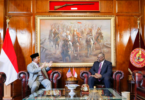WASHINGTON (Sputnik): During a surprise visit to Iraq late last year, President Donald Trump said that he has “no plans at all” to remove US troops from the Middle Eastern country, stressing his interest in wanting more soldiers deployed there from Syria. He announced the withdrawal of US forces from Syria in December 2018.
In an interview with CBS News on Sunday, President Donald Trump specifically signalled his readiness to keep US troops in Iraq to keep an eagle eye on Iran.
Referring to the huge sums of money that are being spent on the US military base in Iraq, Trump made clear that one of the reasons he wants to keep it is “to be looking a little bit at Iran because Iran is a real problem”.
He also described Iran as a “vicious country that kills many people”.
When asked if he meant that he wanted to launch a strike on Iran, Trump said, “No, because I want to be able to watch Iran.”
“All I want to do is be able to watch. We have an unbelievable and expensive military base built in Iraq. It’s perfectly situated for looking at all over different parts of the troubled Middle East rather than pulling up,” he underscored.
During the interview, Trump also defied previous US intelligence conclusions that Tehran actually complies with the Iran nuclear deal.
“I disagree with them. I have intel people, but that doesn’t mean I have to agree,” Trump said.
Trump defended his decision to withdraw troops from Syria but refused to provide a timetable for the pullout, which was criticized by members of his own Republican Party and caused concern among some allies in the region.
He said some of the forces moving out of Syria will go to the base in Iraq and “ultimately some will be coming home.”
Speaking about the crisis in Venezuela, Trump said U.S. military intervention was “an option.”
“Well I don’t want to say that. But certainly it’s something that’s on the- it’s an option,” he said.
Trump also said Venezuelan President Nicolas Maduro requested a meeting with him a few months ago but he turned it down.
Juan Guaido, head of the opposition-controlled National Assembly, called Maduro’s presidency “illegitimate” and declared himself Venezuela’s legitimate ruler on Jan. 23.
The U.S., Canada and several other countries recognized Guaido as the interim president, while Turkey, Russia, Cuba and other nations voiced support for Maduro.
Shortly after protests broke out against Maduro, Venezuela’s most important regional military commanders and its defense minister issued a statement in support of Maduro, describing Guaido as a coup-monger backed by Washington.
On Saturday, Maduro said he was willing to sit down for talks with the opposition in an effort to promote national “harmony.”






